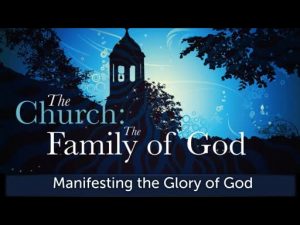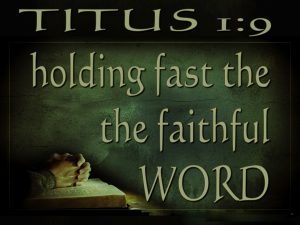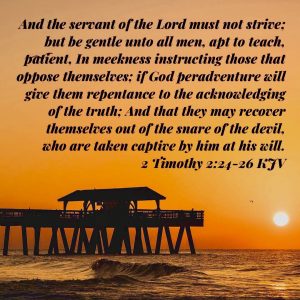 Good evening, all. I was reviewing the folder in which I keep my midweek lessons and I was surprised that we started our series on the Church at the end of July. At the time, I envisioned that the series would take about 8-10 weeks. But here we are on the 14th week with quite a bit still to go…and that after leaving out quite a bit of the material I could have chosen to explore further! I guess, to some extent, that’s the nature of all teaching…there always appears to be more to say! I appreciate your sticking with me through this series and I hope you have found it valuable and enlightening. It is very important that we have a clear understanding of the Church as it is a unique creation of God Himself, designed and empowered to be a driving force in the establishment of His kingdom. But much more than that, the Church is quite literally the family of God, composed of adopted sons and daughters, forgiven of their sins, redeemed from sin and death, new creations indwelt by the Holy Spirit, and knitted together to be the presence of Christ in the world. We are not only to be like Jesus as individuals…we are to be like Him corporately, jointly as His people. The Church is that thing in the world most precious to God, and that which He relies on to accomplish His purposes and will. So, it is good to look deeply into the nature of the Church to determine our identity and purpose.
Good evening, all. I was reviewing the folder in which I keep my midweek lessons and I was surprised that we started our series on the Church at the end of July. At the time, I envisioned that the series would take about 8-10 weeks. But here we are on the 14th week with quite a bit still to go…and that after leaving out quite a bit of the material I could have chosen to explore further! I guess, to some extent, that’s the nature of all teaching…there always appears to be more to say! I appreciate your sticking with me through this series and I hope you have found it valuable and enlightening. It is very important that we have a clear understanding of the Church as it is a unique creation of God Himself, designed and empowered to be a driving force in the establishment of His kingdom. But much more than that, the Church is quite literally the family of God, composed of adopted sons and daughters, forgiven of their sins, redeemed from sin and death, new creations indwelt by the Holy Spirit, and knitted together to be the presence of Christ in the world. We are not only to be like Jesus as individuals…we are to be like Him corporately, jointly as His people. The Church is that thing in the world most precious to God, and that which He relies on to accomplish His purposes and will. So, it is good to look deeply into the nature of the Church to determine our identity and purpose.
In the past weeks, we have explored the majesty of the Church and saw the glory which is reflected in us and the tremendous value God assigns to us. We saw that the Church was, in large part, a mystery prior to its inception. We were reminded that God is the master, owner, and builder of the Church and that we are His. We looked at the tremendous word pictures…the metaphors… found in God’s Word that are descriptive of the Church and its relationship with our Lord and God. We looked at the Church’s mission and purpose, and finally… most recently… we have been looking at how God has designed the Church to work together to determine God’s will and direction and become mature. To this end, we see that God has placed men in the church to guide and uphold it…to be God’s spokespersons and under-shepherds. And we have seen that these men, appointed by God, have a high calling and profound responsibility… and as such, must have high qualifications and maturity as well. It is to this topic that we return this evening.
We are working through 2 Tim 3:1-7 and Tit 1:5-9, as these are the primary passages in God’s Word that talk about the qualifications for leadership in the church. I Ti 3:1ff says, “It is a trustworthy statement: if any man aspires to the office of overseer, it is a fine work he desires to do. 2 An overseer, then, must be above reproach, the husband of one wife, temperate, prudent, respectable, hospitable, able to teach, 3 not addicted to wine or pugnacious, but gentle, peaceable, free from the love of money. 4 He must be one who manages his own household well, keeping his children under control with all dignity 5 (but if a man does not know how to manage his own household, how will he take care of the church of God?), 6 and not a new convert, so that he will not become conceited and fall into the condemnation incurred by the devil. 7 And he must have a good reputation with those outside the church, so that he will not fall into reproach and the snare of the devil.”
The main qualification for an elder… a man entrusted with the leadership and oversight of the church… is that he be “above reproach”. We looked at this extensively last week and determined that all the qualifications that follow define what “above reproach” looks like and how it behaves. We ended our study of last week looking at the term “respectable”, so today we will continue with the term “hospitable”.
 “Hospitable” in the Greek is philoxenos and literally means a “lover of strangers”. It describes a love for strangers and brothers alike that opens home and heart to their needs. . It is found in both the Timothy and Titus passages as a qualification for eldership, as well as one other place in the Word. In 1 Pet 4:9, right after encouraging his readers to be fervent in their love for one another, Peter writes, “Be hospitable to one another without complaint.” Being hospitable is being generous with your time and worldly goods on behalf of others, most specifically to those you don’t really know. In New Testament times travelers would often stay in private homes during their journeys. Inns were infrequently found and often hazardous places to stay. Instead, they would stay with friends or family…and often with a “friend of a friend”. Perhaps one of the best examples of hospitality is found in Matt 25:35ff, where we read, “ For I was hungry, and you gave Me something to eat; I was thirsty, and you gave Me something to drink; I was a stranger, and you invited Me in; 36 naked, and you clothed Me; I was sick, and you visited Me; I was in prison, and you came to Me.” We see the same thing in the tale of the Good Samaritan. And we find, in the passage we are studying, that is an important qualification for elders. That should come as no surprise to us, for a good shepherd spends his time and resources… even his life… for the sheep under his care. Would we not expect that kind of love to extend to others in his midst? And do we not want to be lead by men with a heart for hospitality?
“Hospitable” in the Greek is philoxenos and literally means a “lover of strangers”. It describes a love for strangers and brothers alike that opens home and heart to their needs. . It is found in both the Timothy and Titus passages as a qualification for eldership, as well as one other place in the Word. In 1 Pet 4:9, right after encouraging his readers to be fervent in their love for one another, Peter writes, “Be hospitable to one another without complaint.” Being hospitable is being generous with your time and worldly goods on behalf of others, most specifically to those you don’t really know. In New Testament times travelers would often stay in private homes during their journeys. Inns were infrequently found and often hazardous places to stay. Instead, they would stay with friends or family…and often with a “friend of a friend”. Perhaps one of the best examples of hospitality is found in Matt 25:35ff, where we read, “ For I was hungry, and you gave Me something to eat; I was thirsty, and you gave Me something to drink; I was a stranger, and you invited Me in; 36 naked, and you clothed Me; I was sick, and you visited Me; I was in prison, and you came to Me.” We see the same thing in the tale of the Good Samaritan. And we find, in the passage we are studying, that is an important qualification for elders. That should come as no surprise to us, for a good shepherd spends his time and resources… even his life… for the sheep under his care. Would we not expect that kind of love to extend to others in his midst? And do we not want to be lead by men with a heart for hospitality?
The next qualification for an elder, or someone aspiring to be an elder, is that he is “able to teach”. This is a critically important qualification for many reasons. It presupposes that the man in question has a good understanding of the Word…He must know the Word before he can teach it. The Word of God is foundational to spiritual growth, understanding, godly behavior and thinking, protection, and evangelism. Paul writes these words in 1 Thes 2:13ff. “ For this reason we also constantly thank God that when you received the word of God which you heard from us, you accepted it not as the word of men, but for what it really is, the word of God, which also performs its work in you who believe”. The Word of God is transformative in the life of the believer. It also sits as the foundation of our salvation and evangelism efforts. James, in 1:21 says, “in humility receive the word implanted, which is able to save your souls.” Paul, in the process of passing the baton to Timothy, says in 2 Tim 2:15, “Be diligent to present yourself approved to God as a workman who does not need to be ashamed, accurately handling the word of truth.” And in 2 Tim 4:1ff Paul speaks with even more force and authority; “I solemnly charge you in the presence of God and of Christ Jesus, who is to judge the living and the dead, and by His appearing and His kingdom: 2 preach the word; be ready in season and out of season; reprove, rebuke, exhort, with great patience and instruction. 3 For the time will come when they will not endure sound doctrine; but wanting to have their ears tickled, they will accumulate for themselves teachers in accordance to their own desires, 4 and will turn away their ears from the truth and will turn aside to myths. 5 But you, be sober in all things, endure hardship, do the work of an evangelist, fulfill your ministry.”
 Beloved, we are called as the children of God to fall in love with his Word. It is to be a “lamp unto our feet” and “hidden in our hearts”. It is to be what we feed on and the foundation for all that we do or think. We are to be obedient to God’s Word… to be “doers of the word, and not hearers only”. Every believer has this obligation…but the elder must go beyond this. He must be “able to teach”. In writing about the qualifications for elders in Titus, we read the parallel passage to this one in Tit 1:9. Here, too, we see the qualification of being able to teach, but in slightly different terms. He says, “holding fast the faithful word which is in accordance with the teaching, so that he will be able both to exhort in sound doctrine and to refute those who contradict.” The elder… the shepherd of a church… is to be completely committed to the Word of God as his authority… to “hold fast the faithful word”. His command of God’s Word must be sufficient to the task of exhorting, encouraging, and protecting God’s flock entrusted to him and his fellow elders. Only then is he considered “able to teach”.
Beloved, we are called as the children of God to fall in love with his Word. It is to be a “lamp unto our feet” and “hidden in our hearts”. It is to be what we feed on and the foundation for all that we do or think. We are to be obedient to God’s Word… to be “doers of the word, and not hearers only”. Every believer has this obligation…but the elder must go beyond this. He must be “able to teach”. In writing about the qualifications for elders in Titus, we read the parallel passage to this one in Tit 1:9. Here, too, we see the qualification of being able to teach, but in slightly different terms. He says, “holding fast the faithful word which is in accordance with the teaching, so that he will be able both to exhort in sound doctrine and to refute those who contradict.” The elder… the shepherd of a church… is to be completely committed to the Word of God as his authority… to “hold fast the faithful word”. His command of God’s Word must be sufficient to the task of exhorting, encouraging, and protecting God’s flock entrusted to him and his fellow elders. Only then is he considered “able to teach”.
The next qualification to consider is a phrase variously translated as not “addicted to wine”, not “an excessive drinker”, or not “given to wine”. The word in the Greek is paroinos, which literally means “alongside of wine”. The overseer…the shepherd… must not be a man who overvalues wine; one who likes to be around it and likes it close by. It speaks of someone who makes wine… or drink… an important part of his life. This does not need great and detailed explanation… we all probably have someone we can think of that never wants to be too far away from a drink. A meal seems incomplete without a drink in hand. A social occasion or celebration without a drink or two would be unheard of. A drink after work to take the edge off…a drink before bed to settle in… these are some of the things we might expect to see in the man who lingers beside his wine. While this man does not necessarily drink to excess, he is a man who enjoys his drink all too much. For it is not merely the wine or drink itself; it is the whole social ambiance and “camaraderie” that goes with it. In addition to the effects of the drink, he enjoys the conviviality of the bar or club, and the gaiety of the party… and it forms an important part of his focus and activities.
An elder cannot be this man. One who is called to the oversight and protection of the church must have his focus on the things of God, not the things of man. He does not seek to escape into worldly comforts and pastimes, but finds his refreshment and joy in godly pursuits and Christian fellowship.
The next qualification of the elder or aspiring elder is that he is not pugnacious…not quarrelsome or quick to strike out. It seems obvious that a man who is prone to fight and lash out when offended or angered would not be a candidate for overseeing the things and people of God. The shepherd of God’s people must not be easily offended and quick to attack in kind. That would be a recipe for disaster in the church, as the elder would be serving as an example of selfish and childish behavior, not of long suffering and godly behavior. It may stand alongside the previous qualification for a reason… those who seek the comfort of wine or drink can become easily irritated and quick tempered when their mood or comfort is broken. It is the duty and loving responsibility of the elder to correct and encourage with gentleness and patience. Look at the example of Paul as he describes himself in 2 Tim 3:10. “Now you followed my teaching, conduct, purpose, faith, patience, love, perseverance, 11 persecutions, and sufferings, such as happened to me at Antioch, at Iconium and at Lystra; what persecutions I endured, and out of them all the Lord rescued me! 12 Indeed, all who desire to live godly in Christ Jesus will be persecuted”. Paul lived out his life as an example of godliness.
 And his instructions to Timothy follow his example. In 2 Tim 2:24ff he writes,” The Lord’s bond-servant must not be quarrelsome, but be kind to all, able to teach, patient when wronged, 25 with gentleness correcting those who are in opposition, if perhaps God may grant them repentance leading to the knowledge of the truth, 26 and they may come to their senses and escape from the snare of the devil, having been held captive by him to do his will.” This passage reiterates many of the character traits we find in Paul’s words to Timothy and Titus. And it clearly affirms that an elder cannot be a violent and easily provoked man…a man given to fits of temper and dangerous to God’s people.
And his instructions to Timothy follow his example. In 2 Tim 2:24ff he writes,” The Lord’s bond-servant must not be quarrelsome, but be kind to all, able to teach, patient when wronged, 25 with gentleness correcting those who are in opposition, if perhaps God may grant them repentance leading to the knowledge of the truth, 26 and they may come to their senses and escape from the snare of the devil, having been held captive by him to do his will.” This passage reiterates many of the character traits we find in Paul’s words to Timothy and Titus. And it clearly affirms that an elder cannot be a violent and easily provoked man…a man given to fits of temper and dangerous to God’s people.
So, we are approaching the end of our time this evening, so we will stop here and pick up the qualifications for leaders next week. But, beloved, what can we take away from this list of qualifications for elders…for shepherds…as we go through this list? Well, obviously we can come to an understanding of how God would build His church and the importance of having mature, committed, godly men serving to lead and oversee that church. For those called by God to that task, it serves to show clearly the high calling and standard that He sets for service in leading the church. But what about those who are not called to formal leadership as an elder…as an overseer? What do these verses say to us?
Let’s just look again at the last passage we read…” The Lord’s bond-servant must not be quarrelsome, but be kind to all, able to teach, patient when wronged, 25 with gentleness correcting those who are in opposition, if perhaps God may grant them repentance leading to the knowledge of the truth, 26 and they may come to their senses and escape from the snare of the devil, having been held captive by him to do his will.” Notice that, while Paul is addressing Timothy, the exhortations to behavior are in reference to “the Lord’s bond-servant”. Beloved, that is all of us. We are all to be kind to all, and not quarrelsome. We are all to be “patient when wronged”. We are all, in some fashion, to be “able to teach”. We are all to be involved in gentle correction and admonition. We are all responsible for bringing people “to repentance and knowledge of the truth”. Again, all this is in keeping with what we find throughout scripture… all of us… but especially those God calls to lead… are to be like Christ.
There is not one playbook for leaders and a different play book for everyone else. There are just different spheres of giftedness and responsibilities…all members of the same body, all under the same Head, all called to the same goal…to walk in a worthy manner . I leave you with the words of Paul to the Ephesians, “Therefore I, the prisoner of the Lord, implore you to walk in a manner worthy of the calling with which you have been called, 2 with all humility and gentleness, with patience, showing tolerance for one another in love, 3 being diligent to preserve the unity of the Spirit in the bond of peace. 4 There is one body and one Spirit, just as also you were called in one hope of your calling; 5 one Lord, one faith, one baptism, 6 one God and Father of all who is over all and through all and in all.”
Let us pray.


0 Comments